

Caregiving for someone with Alzheimer’s is rewarding yet emotionally and physically demanding. Caregiver burnout, marked by exhaustion, stress, and declining mental health, is a serious issue. This guide explores practical prevention tips, draws insights from social platforms, and highlights trusted sources for information and support.
“Caregiver burnout or caregiver fatigue is a state of physical, emotional, and mental exhaustion brought about by unrelieved stress” (agingcare.com Calmerry.com time.com). Dementia caregivers often experience disproportionately high levels of stress, depression, anxiety, and adverse physical health outcomes like elevated stress hormones and weakened immunity (american journal of geriatric psychiatry).
Here are evidence-backed strategies compiled from leading Alzheimer’s and caregiving organizations:
Tip | Description |
|---|---|
1. Prioritize Self‑Care & Physical Health | Maintain regular check-ups, eat well, sleep, and exercise daily—even light walking helps (dshs) |
2. Build Social Support & Use Respite Care | Join support groups, delegate care tasks, and schedule breaks using respite services (alz.org) |
3. Use Relaxation & Stress-Management Techniques | Try meditation, deep breathing, muscle relaxation, and visualization exercises (verywellminded.com) |
4. Set Realistic Expectations | Accept that perfection isn’t sustainable; aim for reasonable goals (e.g. 80% gets done) (NCCDP) |
5. Access Resources & Education | Use online tools, local community services, and clinical trials to support caregiving (NIA) |

Reddit caregivers often emphasize the value of peer support saying things like “being able to vent with people in the same situation is a lifeline.” Although not directly searched here, such communities provide informal validation and shared strategies.
We built the Patient Support Tool (PaST) to help caregivers and patients manage care, understand what is happening medically and avoid burnout by having trusted information and the patients data guide care.
Alzheimer’s Association: Access a 24/7 helpline, ALZConnected online community, local chapters, support groups, and interactive tools like ALZNavigator™.
Alzheimer Society of Canada: Offers local services, relaxation strategies, self-care advice, and the importance of maintaining personal interests.
National Institute on Aging (U.S.): Connects caregivers with clinical trials and research-based strategies for well-being.
Alzheimers.gov: Delivers caregiving tips on routines, calendars, and medication reminders.
Clinical & Academic Institutions: UCSF and others offer coping strategy guidance and referrals to support networks.
Specialized Support Groups: Memory Cafés, faith-based groups, virtual forums, senior centers, and nonprofits offer social and emotional support.
Maybe the PaST can help you: